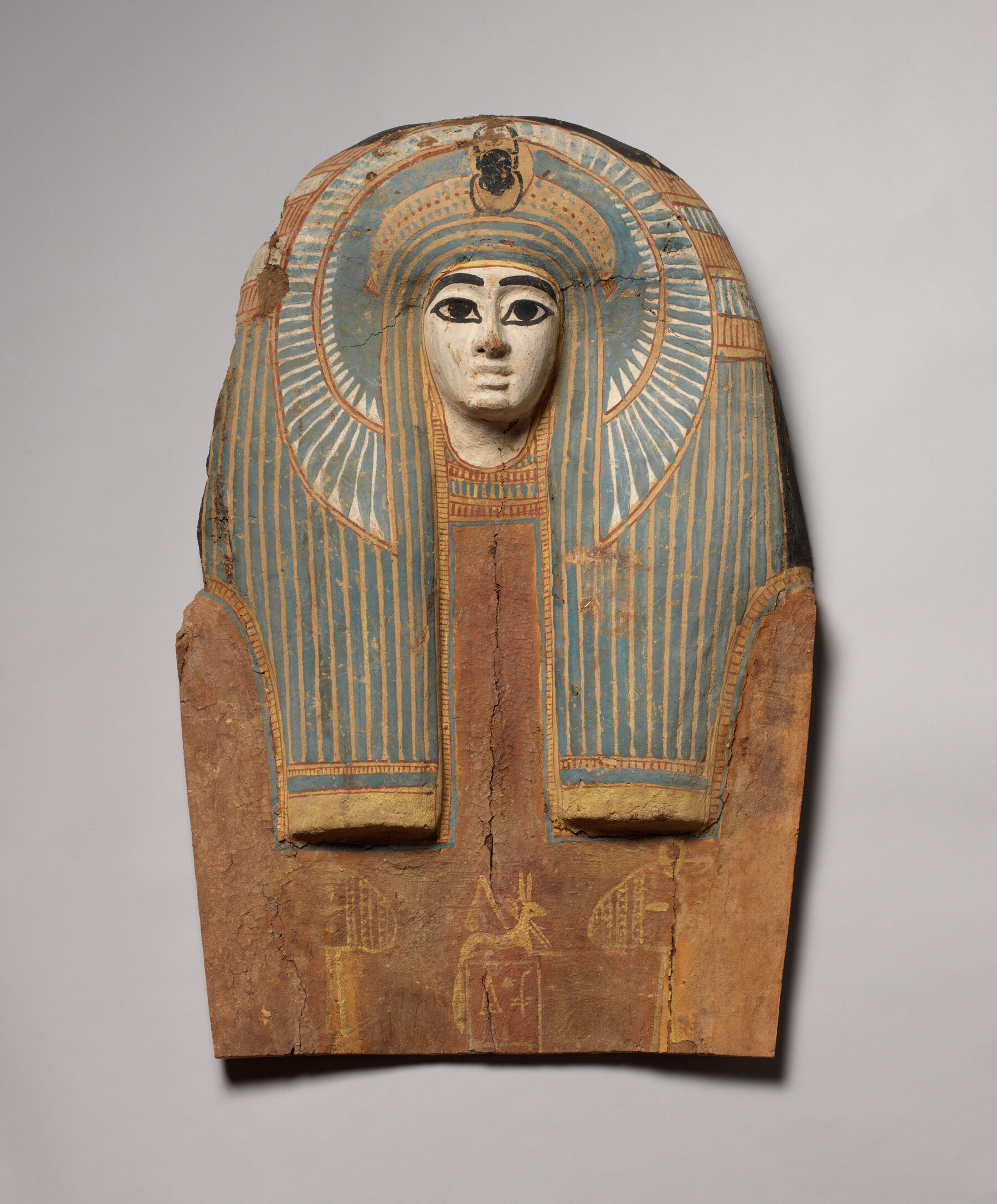The upper part of a coffin board depicts a woman wearing a vulture headdress over a blue and yellow striped tripartite wig. Above her forehead is a black-winged scarab pushing a yellow orb. Her face is pale yellow, with eyes and eyebrows painted black. A beaded collar adorns her neck, and her two fists emerge from her wrappings. Between her hands is a column of text surmounted by the jackal god Anubis, holding his insignia. The single column of yellow-painted hieroglyphs gives the typical htp-di-nsw (“a gift that the king gives”) offering formula. The lower part of the coffin board with the owner’s name and titles was cut off.
Similar coffin lids were found in the Memphite region, particularly in the Faiyum.1 The woman’s vulture headdress, once the insignia of royalty and goddesses, began to appear on coffins of priestesses and high-ranking women in the Third Intermediate period.2 The feathers, blue stripes, and headdress are painted in Egyptian blue. The wig’s end bands and column texts are colored with yellow orpiment (an arsenic sulfide). Egyptian blue and orpiment are composed of coarsely ground crystalline particles that give the surface luminous and sparkling visual energy.3 In particular, the visual energy of Egyptian blue may have acted as a catalyst to bestow life to the coffin and the mummy within.4
MH
-
Taylor, John H. 2009. “Coffins as Evidence for a ‘North-South Divide’ in the 22nd – 25th Dynasties.” In The Libyan Period in Egypt: Historical and Cultural Studies into the 21st-24th Dynasties: Proceedings of a conference at Leiden University, October 25-27, edited by G.P.F. Broekman, R.J. Demarée and O.E. Kaper, 375–415. Egyptologische Uitgaven 23. Leiden: Peeters Leuven.. ↩︎
-
Taylor, John H. 1989. Egyptian Coffins. Princes Risborough: Shire.; Teeter, Emily, and Janet H. Johnson, eds. 2009. The Life of Meresamun: A Temple Singer in Ancient Egypt. OIMP 29. Chicago: The University of Chicago.. ↩︎
-
Strong, Megan E. 2018. “Do You See What I See? Aspects of Color Choice and Perception in Ancient Egyptian Painting.” Open Archaeology 2018.4: 173–184. https://doi.org/10.1515/opar-2018-0011. ↩︎
-
Corcoran, L. H. 2016. “The Color Blue as an “Animator” in Ancient Egyptian Art.” In Essays in Global Color History: Interpreting the Ancient Spectrum, edited by R. B. Goldman, 59–82. Piscataway: Gorgias Press.. ↩︎
Bibliography
- Corcoran 2016
- Corcoran, L. H. 2016. “The Color Blue as an “Animator” in Ancient Egyptian Art.” In Essays in Global Color History: Interpreting the Ancient Spectrum, edited by R. B. Goldman, 59–82. Piscataway: Gorgias Press.
- Strong 2018
- Strong, Megan E. 2018. “Do You See What I See? Aspects of Color Choice and Perception in Ancient Egyptian Painting.” Open Archaeology 2018.4: 173–184. https://doi.org/10.1515/opar-2018-0011
- Taylor 1989
- Taylor, John H. 1989. Egyptian Coffins. Princes Risborough: Shire.
- Taylor 2009
- Taylor, John H. 2009. “Coffins as Evidence for a ‘North-South Divide’ in the 22nd – 25th Dynasties.” In The Libyan Period in Egypt: Historical and Cultural Studies into the 21st-24th Dynasties: Proceedings of a conference at Leiden University, October 25-27, edited by G.P.F. Broekman, R.J. Demarée and O.E. Kaper, 375–415. Egyptologische Uitgaven 23. Leiden: Peeters Leuven.
- Teeter and Johnson 2009
- Teeter, Emily, and Janet H. Johnson, eds. 2009. The Life of Meresamun: A Temple Singer in Ancient Egypt. OIMP 29. Chicago: The University of Chicago.
